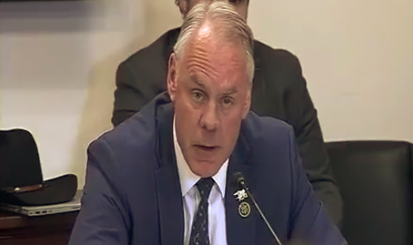
- Details
- By Levi Rickert
WASHINGTON — Interior Secretary Deb Haaland (Laguna Pueblo) was on Capitol Hill Tuesday to defend the Biden administration’s $18.9 billion 2024 budget request for the agency that manages most federal lands, natural resources and programs for Native Americans.
The President is asking for a nearly $2 billion increase for the Interior's budget next year.
While Haaland traveled to the House Interior, Environment Appropriations Subcommittee to talk about the budget, Rep. Ryan Zinke (R-MT) wanted to talk to her about the Interior Department’s current stance on policies he supported as Interior Secretary during the Trump administration.
Zinke, who held the position for less than two years before resigning under pressure, used his allotted time to grill Haaland on the Interior shift in mining policies that he had supported at Interior. He also questioned Haaland about her recent decision to withdraw a land exchange in Alaska between the Interior Department and King Cove Corporation that was signed by his successor, Interior Secretary David Bernhardt, in July 2019.
After the hearing, in an apparent effort to extend an olive branch, Zinke told Haaland: "I may wear a hat but it's not cowboys and Indians, I hope you know that."
Haaland laughed.
Zinke later accused Haaland of not being able to answer his questions. His congressional office posted on its website the following exchange:
ZINKE: Are you aware that China produces more emissions than any other country on the planet?
HAALAND: I probably read that somewhere,
ZINKE: Are you aware that China produces 90% of plastic from four rivers?
HAALAND: I’ll take that to be true.
ZINKE: Are you aware that by multiple studies, that in order to satisfy the present requirement of EV and critical minerals, it would take an increase of 2,000% in minerals needed in the next twenty years?
HAALAND: Thank you for that information.
ZINKE: Are you aware that Northern Minnesota is home to those critical minerals?
HAALAND: I am not sure.
ZINKE: Can you pick any place in the United States that you’ve identified to fast-track so we are not vulnerable to China and Russia both In defense and EV?
HAALAND: We are working on identifying those critical minerals.
ZINKE: You would agree that not having the critical minerals identified and produced in this country is a security problem and prevents us from moving ahead on multiple issues, and makes us vulnerable to China?
HAALAND: Energy independence is a priority to President Biden.
In defense of the Interior’s Department’s 2024 budget increase request, Haaland told the Republican-led committee that $4.7 billion would be appropriated to the Interior Department’s tribal programs, which would provide an increase of $690 million over 2023 spending.
While maintaining tribal needs, including land management, law enforcement, and health care, are nonpartisan priorities for the committee, the subcommittee Chairman Mike Simpson (R-ID) said the Interior Department would not be immune from the GOP-led House’s efforts to slash domestic spending.
"We need to have a serious discussion about how to do more with less," Simpson told Haaland. "We'll be looking for ways to increase efficiencies, reduce duplication and ensure that federal dollars are spent wisely with a demonstrated benefit.”
Haaland defended the requests by saying the Interior Department is understaffed and the request for additional funding is justified.
More Stories Like This
Native News Weekly (August 25, 2024): D.C. BriefsNavajo Nation Mourns the Passing of Former Vice President Rex Lee Jim
Deb Haaland Earns Endorsement From Communications Workers of America Local 7076
University Soccer Standout Leads by Example
Two Native Americans Named to Democratic Congressional Campaign Committee's“Red to Blue” Program
Help us defend tribal sovereignty.
At Native News Online, our mission is rooted in telling the stories that strengthen sovereignty and uplift Indigenous voices — not just at year’s end, but every single day.
Because of your generosity last year, we were able to keep our reporters on the ground in tribal communities, at national gatherings and in the halls of Congress — covering the issues that matter most to Indian Country: sovereignty, culture, education, health and economic opportunity.
That support sustained us through a tough year in 2025. Now, as we look to the year ahead, we need your help right now to ensure warrior journalism remains strong — reporting that defends tribal sovereignty, amplifies Native truth, and holds power accountable.
 The stakes couldn't be higher. Your support keeps Native voices heard, Native stories told and Native sovereignty defended.
The stakes couldn't be higher. Your support keeps Native voices heard, Native stories told and Native sovereignty defended.
Stand with Warrior Journalism today.
Levi Rickert (Potawatomi), Editor & Publisher


